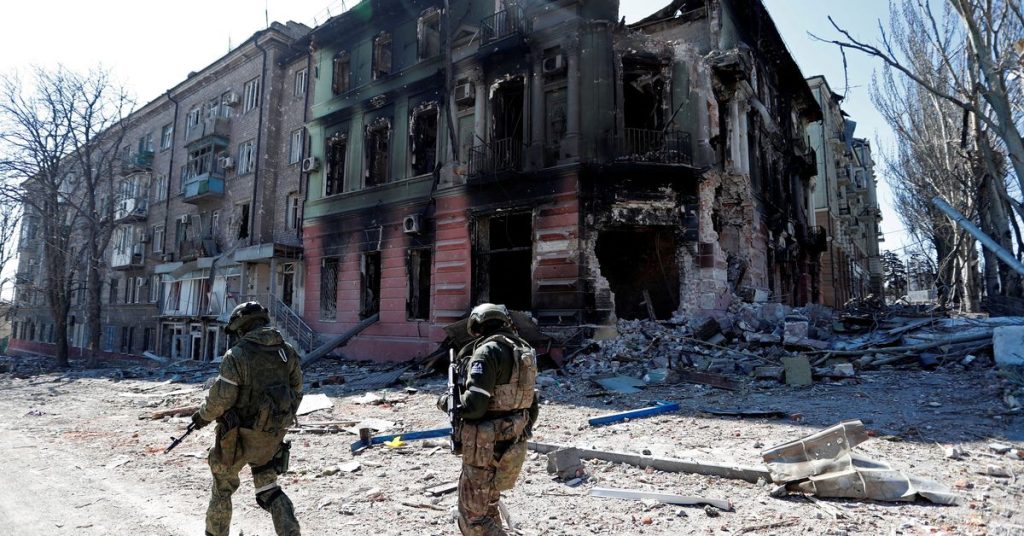
Kyiv (Reuters) – Ukraine said on Monday that tens of thousands of people were likely killed in Russia’s attack on the southeastern city of Mariupol, while its human rights ombudsman accused Russian forces in the area of torture and executions.
Reuters confirmed widespread devastation in Mariupol, but was unable to verify the alleged crimes or estimate the deaths in the strategic city, which lies between Russia’s annexed Crimea peninsula and areas of eastern Ukraine controlled by Russian-backed separatists.
“Mariupol has been destroyed, there are tens of thousands of dead, but despite this, the Russians have not stopped their offensive,” President Volodymyr Zelensky said in a video address to South Korean lawmakers.
Register now to get free unlimited access to Reuters.com
If confirmed, it would be the largest death toll reported to date in one place in Ukraine, where cities, towns and villages have been relentlessly bombed and corpses, including civilians, have been seen in the streets.
More than 5,000 people have been killed in Mariupol, Denis Pushlin, president of the self-proclaimed Donetsk People’s Republic, told Russia’s RIA news agency on Monday. He said the Ukrainian forces are responsible.
The numbers of people leaving the city have fallen because Russian forces have slowed down pre-departure checks, Petro Andryushenko, the assistant mayor of Mariupol, said Monday on the Telegram messaging service.
He said that about 10,000 people are waiting for examination by Russian forces. Russia does not allow military personnel to leave with evacuees. There was no immediate comment from Moscow, which has previously blamed Ukraine for preventing the evacuations.
Citing figures from the Mariupol city administration, Ukrainian Human Rights Ombudsman Lyudmila Denisova said that 33,000 Mariupol residents have been deported to Russia or lands controlled by Russian-backed separatists in eastern Ukraine. Russia said on Sunday it had “evacuated” 723,000 people from Ukraine since starting what it called its “special operation”. Moscow denies attacking civilians.
“Witnesses reported that Russian National Guard forces and (Chechen) Kadyrovite units are making illegal arrests, torturing and executing detainees for any pro-Ukrainian stance” in Mariupol, Denisova said in a post on Telegram.
The Russian government did not immediately respond to a request for comment on the torture allegations.
Anton Gerashchenko, an adviser to Ukraine’s Interior Ministry, said in a television interview on Monday that “deported” Ukrainians were being held in guarded sanatoriums and holiday camps.
“These people are not allowed to move freely or freely access communication platforms in order to contact their relatives in Ukraine,” he said, without citing direct evidence.
Ukrainian Deputy Prime Minister Irina Vereshuk told Reuters the number of checkpoints along the Russian-controlled corridor between Mariupol and the Ukrainian city of Zaporizhia had increased from three to 15.
Vereshuk said on Telegram that Mariupol was among nine humanitarian corridors agreed by Russia on Monday to evacuate people from the besieged eastern regions, but that its corridor is for private cars only.
She said it was not possible to agree on the provision of buses.
Ukraine says Russian forces are mobilizing to launch a new offensive on eastern regions, including Mariupol, where people have been without water, food and energy supplies for weeks. Read more
Register now to get free unlimited access to Reuters.com
Additional reporting by Max Hunder and Elizabeth Piper. writing by Conor Humphreys; Editing by Philippa Fletcher, William MacLean and Grant McCall
Our criteria: Thomson Reuters Trust Principles.




More Stories
Journalists convicted in Hong Kong sedition case
Stand News: Hong Kong journalists convicted of sedition in case critics say highlights erosion of press freedom
Shark decapitates teen off Jamaica coast